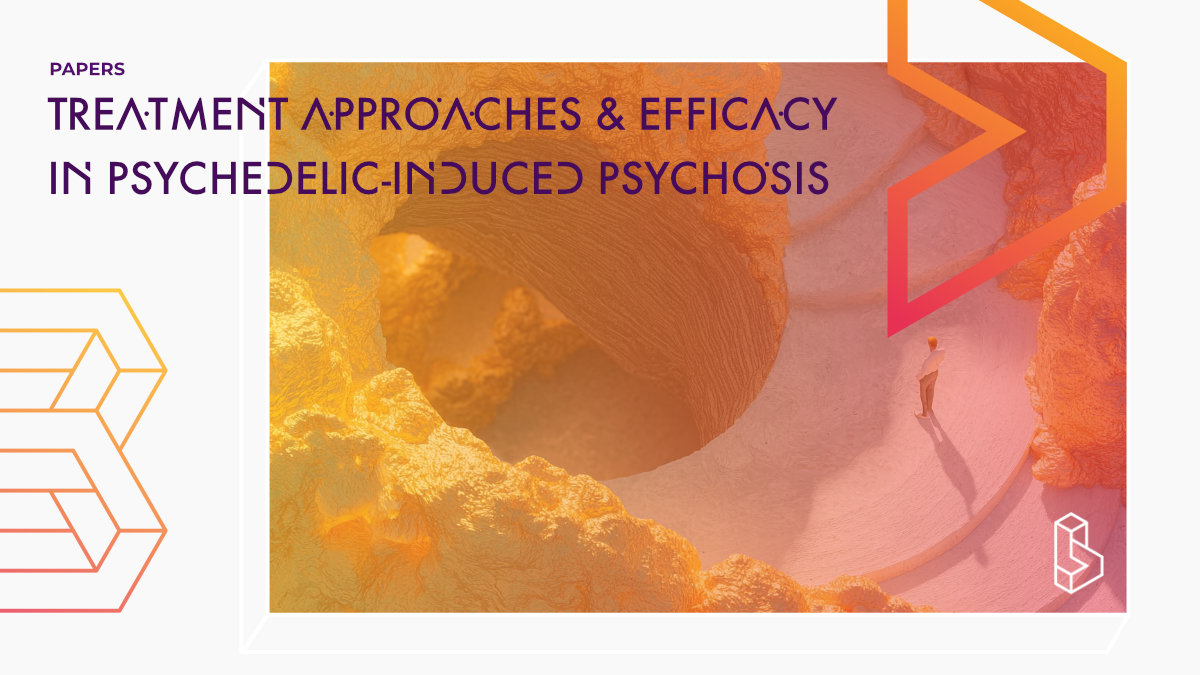This systematic review (n=93 cases) found that psychedelic-induced psychosis, primarily caused by LSD and MDMA, lasted an average of 1.8 weeks and responded much better to second-generation antipsychotics (91% response rate) than first-generation antipsychotics (27% response rate), though one-third of patients later developed schizophrenia spectrum disorders.
Abstract of Treatment approaches and efficacy in Psychedelic-Induced Psychosis
“Psychedelics are increasingly used in the general population, yet they are associated with increased risk of psychosis in a minority of users that can experience psychedelic-induced psychosis (<1% in controlled trial settings). In contrast, the evidence regarding the treatment of psychedelics-induced psychosis remains to date scarce.
We conducted a PRISMA 2020-compliant systematic review (CRD42023399591), searching electronic databases (inception–August 2024) for interventional, observational studies, case series, or case reports on the treatment of psychedelic-induced psychosis. Frequencies of population, treatment, and outcome characteristics were analyzed. We included 14 case series, 20 case reports, and one prospective study, reporting on 93 cases of psychedelic-induced psychosis, between 1955 and 2024. The primary substances implicated were LSD (47.3%) and MDMA (38.7%), and the average patient age of 23.7+6.3 years, with a predominance of male subjects (88%). Psychosis lasted an average of 1.8 weeks. We identified two main treatment categories: first-generation antipsychotics (n=37) and second-generation antipsychotics (n=57). Electroconvulsive therapy was used in a minor subset of cases (n=9). The response rate for first-generation antipsychotics (27%) was significantly lower than that for second-generation agents (91.3%) and electroconvulsive therapy (91%). Follow-up data indicated 34% of patients later developed schizophrenia spectrum disorders, and 20.4% were diagnosed with bipolar disorder. However, the lack of comprehensive follow-up limits the interpretation of findings In conclusion, the evidence supporting treatment options remains limited, primarily based on case reports. Our findings suggest that second-generation antipsychotics seem to be more beneficial in managing psychedelic-induced psychosis, warranting further investigation into optimized treatment protocols.”
Authors: Adi Sulstarova, Luise Scheuerlein, Silvia Monari, Federico Seragnoli, Thorens Gabriel, Katrin H. Preller, Kerem Böge, Othman Sentissi, Stefan Kaiser, Marco Solmi, Matthias Kirschner & Michel Sabé
Summary of Treatment approaches and efficacy in Psychedelic-Induced Psychosis
The authors open by noting the sharp rise in non-clinical use of classical psychedelics—including LSD, psilocybin, ayahuasca/DMT, mescaline and MDMA—over the past decade, particularly among people seeking relief from mental-health conditions. Despite this growth, psychedelic-induced psychosis (psychotic symptoms persisting for more than 24 hours after ingestion) remains rare, with recent meta-analytic data placing its prevalence below 4% in both clinical and non-clinical samples.
The syndrome is mechanistically linked to overstimulation of serotonin 5-HT2A receptors and, for some compounds, downstream dopaminergic or glutamatergic cascades. Crucially, formal guidance on how best to manage these episodes is lacking, and previous studies have systematically excluded individuals with personal or familial psychosis, leaving clinicians without evidence-based protocols. Against this backdrop, Sulstarova and colleagues set out to synthesise every published account of treatment for psychedelic-induced psychosis and to gauge the relative efficacy of different interventions.
Methods
Search strategy and eligibility
Find this paper
Treatment approaches and efficacy in Psychedelic-Induced Psychosis: A systematic review
https://doi.org/10.1016/j.ajp.2025.104604
Open Access | Google Scholar | Backup | 🕊
Cite this paper (APA)
Sulstarova, A., Scheuerlein, L., Monari, S., Seragnoli, F., Gabriel, T., Preller, K., ... & Sabé, M. (2025). Treatment approaches and efficacy in Psychedelic-Induced Psychosis: A systematic review. Asian Journal of Psychiatry, 104604.

